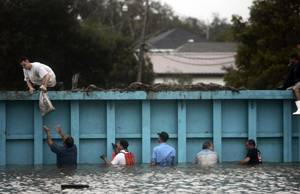Gustav Pummels Gulf Coast

Emergency workers and volunteers from Plaquemines Parish and St. Bernard Parish work to sandbag leaking floodgates between St. Bernard Parish and the Plaquemines East Bank levee protecting the town of Braithwaite, La., on Monday, Sept. 1, 2008. (AP Photo/San Antonio Express-News, Lisa Krantz)
September 1, 2008
When Hurricane Katrina hit, Thomas Hill’s brothers refused to evacuate, losing touch with family for almost an entire week.
“They got caught up in the flooding and we didn’t know where they were for about six or seven days,” said Hill, vice president of student affairs.
Hill said he still has family and friends in New Orleans, but everyone is much better prepared for Hurricane Gustav, and they have learned, saying that this time most of them evacuated last week.
“They have paid very close attention to the forecast in spite of some uncertainty in the forecast,” said William Gutowski, professor of geological and atmospheric sciences.
Gutowski said they have paid a lot of attention to the bad experiences from Katrina, and that has left them better prepared. Although he thinks the flooding will be less severe than it was with Katrina, he said there is still a potential of creating other natural disasters, such as tornadoes, when the storm hits.
“It’s sort of a funny concern, but because many people have evacuated the gulf coast and the damage is not as severe, then I would not want people in the future to say that they went overboard or that there was no need to leave,” Gutowski said.
Gutowski said they are unsure of the hurricanes’ connections with global warming, although a warmer climate increases the likelihood of hurricanes and stronger hurricanes.
“Around the world there has been a tendency for more strong tropical cyclones, and it’s consistent with the sources of energy that global warming would produce — we’re in the early stages of understanding,” he said. “The patterns that have occurred are consistent with it, but I wouldn’t definitely say that is the case.”
Hill, who was born and raised in a housing project in New Orleans, said he visited the city in late July and thought it was strange to see the area where he grew up completely vacant.
“Everything is demolished or torn down,” he said.
Hill said the area where he grew up was old, and that he wouldn’t say Katrina demolished the area completely, but it “definitely accelerated the demolition” of the area.
Hill also said, referring to rebuilding after Katrina, that people have been doing a much better job of making things “hurricane proof,” such as making buildings strong enough to withstand the strong winds the storms bring.
“I have a brother who is rebuilding his home, and I am also rebuilding my home down there, and those are the considerations we are making — that it can withstand high winds,” he said.






